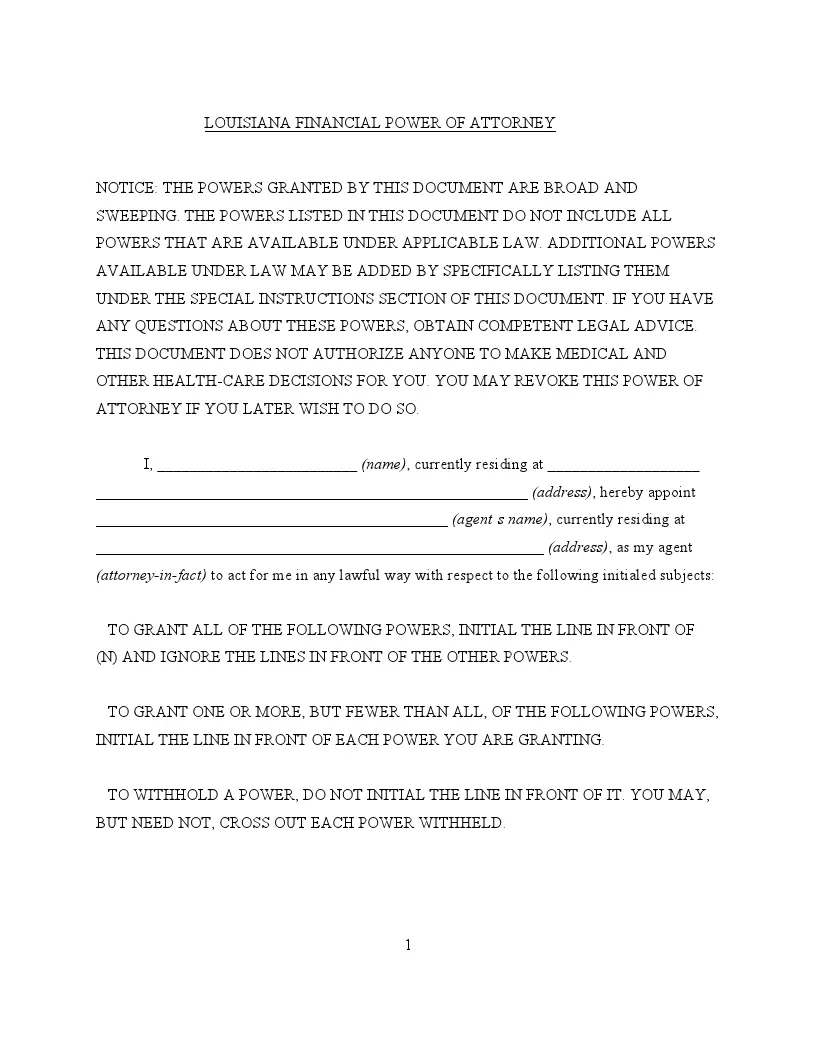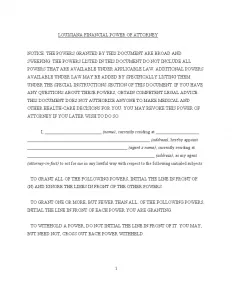Louisiana General Financial Power of Attorney Form
The Louisiana general financial power of attorney grants broad powers to an individual, known as the agent or attorney-in-fact, to manage the financial affairs of the person who authorizes it, called the principal. This legal document is versatile and encompasses various responsibilities, including buying and selling property, managing real estate, handling bank transactions, and dealing with other financial matters.
Louisiana does not follow the Uniform Power of Attorney Act, which many other states adhere to. In this state, a “mandate” refers to what is commonly known elsewhere as a power of attorney form. This legal arrangement allows one person, known as the mandatary, to act on behalf of another, the mandator, with the authority to perform certain acts or manage affairs as specified in the mandate agreement. If you need to draft a mandate or Louisiana power of attorney, follow this link to our state-specific page.

Build Your Document
Answer a few simple questions to make your document in minutes
Save and Print
Save progress and finish on any device, download and print anytime
Sign and Use
Your valid, lawyer-approved document is ready
Louisiana law treats mandates with great detail, especially given the state’s unique blend of civil law influences:
- A mandate in Louisiana can be oral or written. Still, written mandates are necessary for certain transactions, especially those involving real estate or where a formal record is required by law.
- The mandatary must act in the best interests of the mandator, with the utmost good faith and loyalty.
- A mandate can end in various ways, including either party’s death, the mandator’s incapacity, completion of the act for which the mandate was given, or revocation.
In Louisiana, the principal can specify the effectiveness of a general power of attorney or mandate. It can either take effect immediately upon signing or be structured to become effective upon a future event.
Louisiana General Power of Attorney Form Details
| Document Name | Louisiana General Power of Attorney Form |
| Other Name | Louisiana Financial Power of Attorney |
| Relevant Laws | Louisiana Civil Code, Articles 2989 to 3034 |
| Avg. Time to Fill Out | 10 minutes |
| # of Fillable Fields | 41 |
| Available Formats | Adobe PDF |
Filling Out Louisiana General (Financial) POA Form
You need to fill out this form carefully to ensure that the agent or mandatary has the correct authority to act by the principal’s wishes.
1. Fill in Personal Details
Start by entering the full name and current residential address of the principal (the person granting the power) and the agent (the person receiving the power). Ensure these details are accurate to prevent any issues related to identity verification.
2. Initial Appropriate Powers
The form lists various powers, from real estate transactions to tax matters. The principal should initial next to each power they wish to grant to the agent. If the principal wishes to grant all listed powers, they should initial only next to the last option and ignore the other lines.
3. Specify Additional Powers or Limitations
This section can tailor the general power of attorney to fit specific needs or circumstances requiring precise instructions.
4. Decide on the Duration
Initial the option specifying when a power of attorney will become effective — immediately or upon a specified future date. Similarly, choose how and when the power will terminate — whether upon a written revocation, a set expiration date, or the principal’s incapacitation as defined in the document.
5. Execute the Document
The principal must sign and date the form in the presence of a notary public. The notary will verify the principal’s identity and ensure that they are signing of their own volition, then seal the document, making it legally binding.
6. Notify Relevant Parties
Provide copies of the executed document to the agent, financial institutions, and any other parties who will interact with the agent under the authority of the general power of attorney. Keeping all relevant parties informed helps facilitate smoother transactions and ensures compliance with the principal’s directives.
